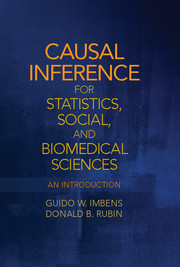Book contents
- Frontmatter
- Dedication
- Contents
- Preface
- PART I INTRODUCTION
- PART II CLASSICAL RANDOMIZED EXPERIMENTS
- PART III REGULAR ASSIGNMENT MECHANISMS: DESIGN
- PART IV REGULAR ASSIGNMENT MECHANISMS: ANALYSIS
- PART V PRGULAR ASSIGNMENT MECHANISMS:SUPPLEMENTARY ANALYSES
- 21 Assessing Unconfoundedness
- 22 Sensitivity Analysis and Bounds
- PART VI REGULAR ASSIGNMENT MECHANISMS WITH NONCOMPLIANCE: ANALYSIS
- PART VII CONCLUSION
- References
- Author Index
- Subject Index
21 - Assessing Unconfoundedness
from PART V - PRGULAR ASSIGNMENT MECHANISMS:SUPPLEMENTARY ANALYSES
Published online by Cambridge University Press: 05 May 2015
- Frontmatter
- Dedication
- Contents
- Preface
- PART I INTRODUCTION
- PART II CLASSICAL RANDOMIZED EXPERIMENTS
- PART III REGULAR ASSIGNMENT MECHANISMS: DESIGN
- PART IV REGULAR ASSIGNMENT MECHANISMS: ANALYSIS
- PART V PRGULAR ASSIGNMENT MECHANISMS:SUPPLEMENTARY ANALYSES
- 21 Assessing Unconfoundedness
- 22 Sensitivity Analysis and Bounds
- PART VI REGULAR ASSIGNMENT MECHANISMS WITH NONCOMPLIANCE: ANALYSIS
- PART VII CONCLUSION
- References
- Author Index
- Subject Index
Summary
INTRODUCTION
The previous three chapters assume a regular assignment mechanism, requiring the assignment mechanism to be individualistic, probabilistic, and unconfounded. In this chapter we maintain the first two conditions, which are often uncontroversial, and focus on the plausibility of the third, most controversial assumption, unconfoundedness. Formally, unconfoundedness requires that the probability of treatment assignment is free of dependence on the potential outcomes. Specifically, the super-population version implies, by Theorem 12.1, first, that the conditional distribution of the outcome under the control treatment, Yi(0), given receipt of the active treatment and given covariates, is identical to its distribution conditional on receipt of the control treatment and conditional on covariates, and second, that, analogously, the conditional distribution of the outcome under the active treatment, Yi(1), given receipt of the control treatment and conditional on covariates, is identical to its distribution given receipt of the active treatment and conditional on covariates. Informally, unconfoundedness requires that we have a sufficiently rich set of pre-treatment variables so that adjusting for differences in values for observed pre-treatment variables removes systematic biases from comparisons between treated and control units. This critical assumption is not testable. The issue is that the data are not directly informative about the distribution of the control outcome Yi(0) for those who received the active treatment (for those with Wi = 1, we never observe Yi(0)), nor are they directly informative about the distribution of the active treatment outcome given receipt of the control treatment (for those with Wi = 0, we never observe Yi(1)). Thus, the data cannot directly provide evidence on the validity of the unconfoundedness assumption. Nevertheless, here we consider ways to assess the plausibility of this assumption from the data at hand.
The analyses discussed in this chapter are supporting or supplementary analyses that can, depending on their results, increase or reduce the credibility of the main analyses. These supporting analyses focus on estimating, and doing inference for, “pseudo”-causal estimands with a priori known values, under assumptions more restrictive than unconfoundedness.
- Type
- Chapter
- Information
- Causal Inference for Statistics, Social, and Biomedical SciencesAn Introduction, pp. 479 - 495Publisher: Cambridge University PressPrint publication year: 2015



